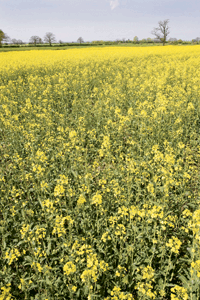Glucosinolate oilseed rape ruling not the end of farm-saved seed

New European rules will not bar the planting of farm-saved oilseed rape seed grown from certified seed contrary to rumours circulating in the industry.
But planting farm-saved seed from an oilseed rape crop grown from farm-saved seed will be effectively banned from autumn 2012, as a result of European Crushers Association (FEDIOL) rules limiting levels of glucosinolate in oilseed rape varieties.
FEDIOL announced last summer that its “members will require their rapeseed suppliers to use certified seed of a variety with a glucosinolate level below 18mmol, as established in official testing at the time of registration, for the production of the commercial oilseed rape crop as of crop 2013”.
The main reason behind the move, according to the NFU‘s Ian Backhouse, is to allow higher inclusion rates of rape meal to be used in animal feed. “Lower glucosinolate levels make the meal more palatable to a wide range of farm animals.”
The wording of the statement had some in the industry suggesting it could mean the end of farm-saved seed oilseed rape crops. But SCOPA‘s Angela Bowden says the organisation has ensured that the FEDIOL position allows first generation farm-saved seed to be grown, provided it comes from a variety that tested at or below 18mmol at registration when planted the previous year.
How that will be policed has not yet been decided, she stresses. “SCOPA does not envisage any further testing being required and are discussing with interested parties the most effective and least cost method of monitoring this.”
One potential method under discussion, Farmers Weekly understands, is for certified seed bag label numbers to be entered on to crop passports. In the case of first generation farm-saved seed crops the label from the certified seed used to grow the parent seed would be entered.
Most current UK varieties are below the 18mmol threshold at registration, including Excalibur, which has been subject to some rumours as its 2009 glucosinolate level on the HGCA Recommended List was above 18mmol. However, its registration level was 17.4%, Monsanto’s Anne Williams confirms, meaning it will be eligible to grow after the rules come into force.
The firm’s Excel is one of the few UK varieties above the limit, however, with a registration figure of 19%. Mrs Williams says discussions are ongoing about its future after 2012.
All future oilseed rape varieties will only be recommended if they are below 18mmol of glucosinolate, HGCA’s Bill Handley says.

